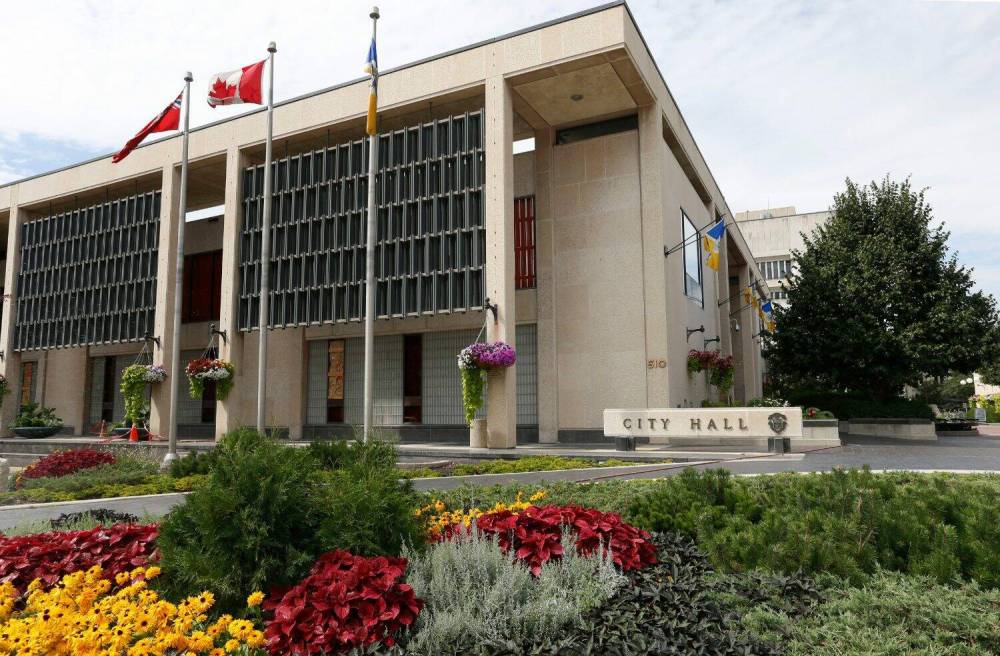A new proposal could significantly hike the dollar value of legal claims senior City of Winnipeg staff can settle without the approval of elected officials.
The city’s chief financial officer is recommending changes that would enable public servants to settle more claims made by or against the city, which she expects would speed up the process and save money.
“Increasing and clarifying the settlement authority … would reduce internal red tape and assist in expediting claims settlements, which would in turn reduce overall costs to the city,” wrote Catherine Kloepfer, in the report.

WAYNE GLOWACKI / FREE PRESS FILES
The City of Winnipeg’s chief financial officer is recommending changes that would enable public servants to settle more claims made by or against the city without requiring the approval of elected officials which she expects would speed up the process and save money.
If city council approves the proposal, the city solicitor would be granted the power to approve settlements worth up to $100,000 (increased from $10,000). The CFO could approve settlements up to $250,000 (increased from $100,000), the chief administrative officer could handle those up to $500,000 (up from $100,000) and the executive policy committee could decide on settlements up to $750,000 (up from $250,000.)
City council approval would be required to settle claims worth more than $750,000, tripling the current $250,000 threshold.
Since public reports on settlements are only required for matters that require EPC or council approval, those would be written only on settlements worth more than $500,000.
In an interview, Kloepfer noted the threshold for the solicitor hasn’t increased since 1993 and the rates are far lower than those of other Canadian cities.
“The costs have gone up, just like everything else, and we’re just trying to keep pace with inflation on this,” she said.
Under the current rules, the political approvals required for many settlements can delay a decision for several weeks, since a report must be written and the resolution must wait for a vote, Kloepfer said.
“I think it’s question of efficiency. And, if we let them linger, the claims tend to grow larger … (so this change would help) spend taxpayers’ money wisely,” she said.
The report stresses designated city staff have the expertise to handle the legal matters involved, noting a 2011 city auditor’s report also recommended increases.
Kloepfer said the matter is growing in importance, since Winnipeg and other cities are seeing legal action become more common.
“We’re consistent with other municipalities in terms of the volumes … In general, people are quicker to make a claim than they may have been 20 years ago,” she said.
Mayor Scott Gillingham said he believes it is time to review the current rules, though he does have questions about transparency.
“Given that the authorization amounts have not been changed in 30 years and there was an auditor’s report over a decade ago that hasn’t been acted upon, I’m pleased to see that we at least have an opportunity to discuss this with a look to updating the amounts. In my initial read of the report, I’m supportive of increasing the delegated authority for the smaller amounts. I do have some questions for our staff, regarding the larger amounts of authorization they’re proposing,” said Gillingham.
Specifically, the mayor said he will question the rules altered for settlements worth $250,000 or more, how much scrutiny such settlements would still receive if the limits increased and whether a public report will be available to list city settlements for each year or six-month period.
“My priority, when I read this report, is the people of Winnipeg, the ratepayers and the taxpayers, and ensuring that they have access to the information of when and where that the city is settling … at the end of the day, these are public funds that are involved and so the public and council need access to the information,” said Gillingham.
Kloepfer stressed the goal of the changes is not to reduce oversight on settlements but to help the city become more efficient.
Coun. Brian Mayes said he believes the city does need to grant staff some power to ensure prompt legal settlements can take place, especially for the smallest claims.
“You do need a threshold. You can’t have council getting involved in every legal settlement … We certainly are involved in a lot of lawsuits right now, so we’ve got to give the staff some authority,” said Mayes (St. Vital).
The councillor notes he is open to approving thresholds that are lower than the ones recommended, however, if his colleagues prefer that option.
The city has publicly reported on significant settlement deals within the past year, including one linked to alleged construction deficiencies in the Winnipeg Police Service Headquarters project. Council approved that settlement last year, which will see the city receive between $21.5 million and $28 million, depending on when payments are made.
Meanwhile, council voted to reject a $446,000 settlement with a towing company, instead raising a $1.1-million court challenge over allegations the municipal government was charged for non-existent courtesy tows.
joyanne.pursaga@freepress.mb.ca
X: @joyanne_pursaga

Joyanne Pursaga
Reporter
Born and raised in Winnipeg, Joyanne loves to tell the stories of this city, especially when politics is involved. Joyanne became the city hall reporter for the Winnipeg Free Press in early 2020.
Our newsroom depends on a growing audience of readers to power our journalism. If you are not a paid reader, please consider becoming a subscriber.
Our newsroom depends on its audience of readers to power our journalism. Thank you for your support.